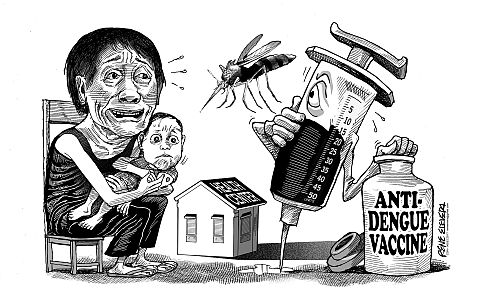Provincial Health Officer Dr. Rene Catan may have felt vindicated by his decision to delay the implementation of the government’s dengue vaccination program for Cebu’s children early this year despite the insistence of local officials to proceed with it.
He did receive flak for questioning the efficacy of Dengvaxia, which was supposed to have a 30-month efficacy period for those that are seropositive (those that had incurred dengue) and seronegative (those who had not contracted dengue).
However, who would have anticipated that the World Health Organization (WHO) which had previously endorsed the vaccine, would issue a Nov. 30 advisory stating that only those who previously contracted dengue should be administered with Dengvaxia?
To his credit though, Dr. Catan said he’s more worried about the children that were seronegative prior to receiving the vaccine last October. And why gloat over being proven right when bigger things than oneself are at stake?
The French pharmacy firm Sanofi Pasteur admitted that those who were seronegative that were treated with the vaccine had a higher chance of contracting severe dengue fever than those who weren’t vaccinated regardless of age.
The Department of Health (DOH) said at least 733,000 children aged nine to 14 years old received Dengvaxia including 158,766 in Cebu, and the regional DOH office has so far yet to produce the numbers of seronegative children that were treated with the vaccine.
As to whether someone benefited from this P3.5 billion vaccination program has yet to be determined and there is no shortage of officials wanting to investigate the snafu.
The Senate health committee has taken the course of prudence by waiting first for the results of the WHO and DOH investigation before launching their inquiry while some groups want to elevate the case to the Department of Justice (DOJ).
While there are some legal actions being readied at the local level, the health officials in Cebu can do better by first coming out with numbers and then coordinating with their local officials to calm down and address the concerns of the parents of the children who underwent vaccination.
These parents are expected to be angry and have every right to be, after the government risked compromising their children’s health with what turned out to be a flawed vaccination program.
We hope local health offices are up to the task and be prepared in the event that a vaccinated child or more contracts dengue.
The Philippines isn’t alone in this as other countries like Brazil face a similar problem. Maybe we can learn from them or they can learn from us on how to deal with this situation.
While it’s important to hold the people responsible for this fiasco accountable, it’s just as important to be prepared to help those who may fall ill and suffer more severely from dengue, no thanks to an ill-timed vaccination.
Disclaimer: The comments uploaded on this site do not necessarily represent or reflect the views of management and owner of Cebudailynews. We reserve the right to exclude comments that we deem to be inconsistent with our editorial standards.

